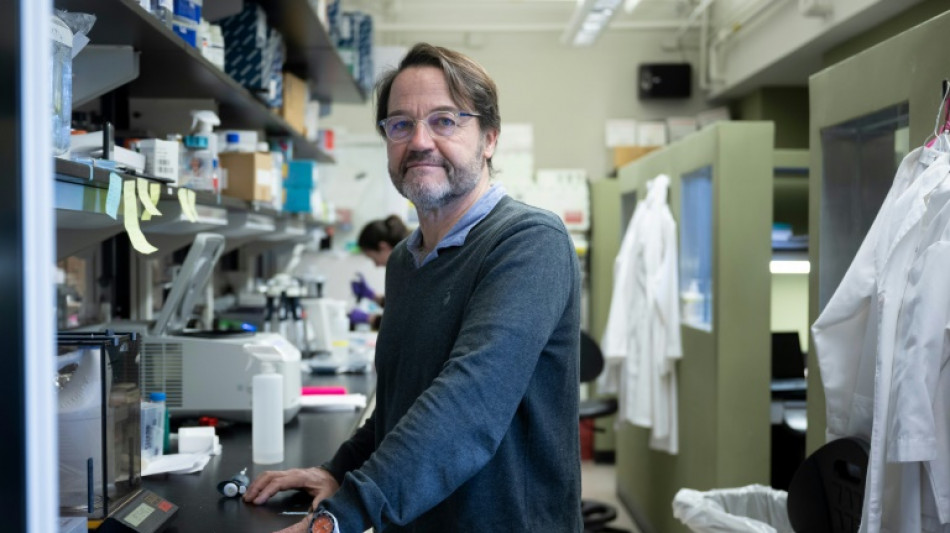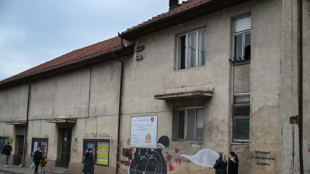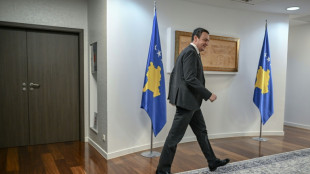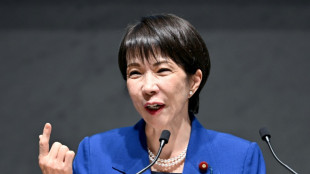
-
 Man Utd made to 'suffer' for Newcastle win, says Amorim
Man Utd made to 'suffer' for Newcastle win, says Amorim
-
Morocco made to wait for Cup of Nations knockout place after Egypt advance

-
 Key NFL week has playoff spots, byes and seeds at stake
Key NFL week has playoff spots, byes and seeds at stake
-
Morocco forced to wait for AFCON knockout place after Mali draw

-
 Dorgu delivers winner for depleted Man Utd against Newcastle
Dorgu delivers winner for depleted Man Utd against Newcastle
-
US stocks edge lower from records as precious metals surge

-
 Somalia denounces Israeli recognition of Somaliland
Somalia denounces Israeli recognition of Somaliland
-
The Cure guitarist and keyboard player Perry Bamonte dies aged 65

-
 Draper to miss Australian Open
Draper to miss Australian Open
-
Police arrest suspect after man stabs 3 women in Paris metro

-
 Former Montpellier coach Gasset dies at 72
Former Montpellier coach Gasset dies at 72
-
Trump's Christmas gospel: bombs, blessings and blame

-
 Russia lashes out at Zelensky ahead of new Trump meeting on Ukraine plan
Russia lashes out at Zelensky ahead of new Trump meeting on Ukraine plan
-
Salah helps Egypt beat South Africa and book last-16 place

-
 Australia's Ikitau facing lengthy lay-off after shoulder injury
Australia's Ikitau facing lengthy lay-off after shoulder injury
-
Another 1,100 refugees cross into Mauritania from Mali: UN

-
 Guardiola proud of Man City players' response to weighty issues
Guardiola proud of Man City players' response to weighty issues
-
Deadly blast hits mosque in Alawite area of Syria's Homs

-
 The Jukebox Man on song as Redknapp records 'dream' King George win
The Jukebox Man on song as Redknapp records 'dream' King George win
-
Liverpool boss Slot says Ekitike reaping rewards for greater physicality

-
 Judge jails ex-Malaysian PM Najib for 15 more years after new graft conviction
Judge jails ex-Malaysian PM Najib for 15 more years after new graft conviction
-
Musona rescues Zimbabwe in AFCON draw with Angola

-
 Zelensky to meet Trump in Florida on Sunday
Zelensky to meet Trump in Florida on Sunday
-
'Personality' the key for Celtic boss Nancy when it comes to new signings

-
 Arteta eager to avoid repeat of Rice red card against Brighton
Arteta eager to avoid repeat of Rice red card against Brighton
-
Nigeria signals more strikes likely in 'joint' US operations

-
 Malaysia's former PM Najib convicted in 1MDB graft trial
Malaysia's former PM Najib convicted in 1MDB graft trial
-
Elusive wild cat feared extinct rediscovered in Thailand

-
 Japan govt approves record budget, including for defence
Japan govt approves record budget, including for defence
-
Seoul to ease access to North Korean newspaper

-
 History-maker Tongue wants more of the same from England attack
History-maker Tongue wants more of the same from England attack
-
Australia lead England by 46 after 20 wickets fall on crazy day at MCG

-
 Asia markets edge up as precious metals surge
Asia markets edge up as precious metals surge
-
Twenty wickets fall on day one as Australia gain edge in 4th Ashes Test

-
 'No winner': Kosovo snap poll unlikely to end damaging deadlock
'No winner': Kosovo snap poll unlikely to end damaging deadlock
-
Culture being strangled by Kosovo's political crisis

-
 Main contenders in Kosovo's snap election
Main contenders in Kosovo's snap election
-
Australia all out for 152 as England take charge of 4th Ashes Test

-
 Boys recount 'torment' at hands of armed rebels in DR Congo
Boys recount 'torment' at hands of armed rebels in DR Congo
-
Inside Chernobyl, Ukraine scrambles to repair radiation shield

-
 Bondi victims honoured as Sydney-Hobart race sets sail
Bondi victims honoured as Sydney-Hobart race sets sail
-
North Korea's Kim orders factories to make more missiles in 2026

-
 Palladino's Atalanta on the up as Serie A leaders Inter visit
Palladino's Atalanta on the up as Serie A leaders Inter visit
-
Hooked on the claw: how crane games conquered Japan's arcades

-
 Shanghai's elderly waltz back to the past at lunchtime dance halls
Shanghai's elderly waltz back to the past at lunchtime dance halls
-
Japan govt approves record 122 trillion yen budget

-
 US launches Christmas Day strikes on IS targets in Nigeria
US launches Christmas Day strikes on IS targets in Nigeria
-
Australia reeling on 72-4 at lunch as England strike in 4th Ashes Test

-
 Too hot to handle? Searing heat looming over 2026 World Cup
Too hot to handle? Searing heat looming over 2026 World Cup
-
Packers clinch NFL playoff spot as Lions lose to Vikings


How genetic therapies transformed the lives of sickle cell patients
Their stories are divided into before and after.
First, those long years of pain which flooded every moment -- school, relationships, work.
And then -- after agonizing treatments -- what felt like the miracle of life after sickle cell disease (SCD).
Two Americans whose lives were turned around by newly approved treatments tell AFP they want others to benefit too.
But the eye-watering cost -- up to $3.1 million per course of treatment -- could limit access for other patients.
- 'Like coming to life' -
Tesha Samuels was born in 1982 -- just before the invention of prenatal screening for SCD, an inherited red blood cell disorder.
SCD affects around 100,000 people in the United States and some 20 million worldwide.
Most people with the condition are Black. Scientists say this is because the sickle cell trait evolved to protect people exposed to malaria, so the risk of SCD is higher.
Those with the disease have abnormal hemoglobin -- the molecule that carries oxygen -- making their red cells hard and C-shaped like sickles.
Complications include anemia, bouts of extreme pain, organ damage and early death.
Tesha was diagnosed aged two and recalls a childhood in and out of hospital.
At seven, she suffered a life-threatening case of anemia and then aged 13 she had a stroke which led to monthly blood infusions.
Tesha said "the stigma of a Black child going to the hospital saying they're in pain" made her wait until things got unbearable.
As a young adult, Tesha saw the disease take the life of a dear friend named Mohammed, a fellow "sickle cell warrior" who would often end up in the same hospital as her.
She began studying at the prestigious Howard University hoping to become a doctor but her health forced her to drop out. She then tried community college but, once more, SCD meant couldn't finish.
"You downgrade your dreams based on your capacity in sickle cell," said Tesha.
As a newlywed in her twenties, she was dismayed at needing an intravenous medicine drip for eight hours every night to manage her condition.
But in 2018 her life turned a corner when she became one of the first ever people to receive an experimental gene therapy.
The procedure -- now marketed as Lyfgenia -- uses a modified virus to deliver a functional version of the hemoglobin-producing gene. .
First, doctors draw out stem cells from the bone marrow before modifying them in a lab. Then comes the hardest part -- chemotherapy to clear the way for the return of the treated cells.
In addition to losing all her hair, chemotherapy saw Tesha have a 16-hour nosebleed which left her in intensive care.
Her recovery was further complicated as her blood platelets, which are essential for blood clotting, took months to bounce back.
But when they did, her energy levels soared.
"It's almost like coming to life," Tesha said. "Here's this new life ahead of you. What do I want to do with it?"
Tesha went back to school to complete her degree.
She also started her own advocacy group, Journey to ExSCellence, to spread word of the treatment among the Black community.
"It looks like the cure, but we like to call this 'transformative,'" said physician-scientist John Tisdale of the National Institutes of Health, which ran the trial Tesha took part in.
Tisdale emphasized that each patient needed monitoring for 15 years to complete the study.
- Childhood struggle -
Jimi Olaghere's first memory of sickle cell goes back to when he was eight-years-old, playing soccer with other kids in his native Nigeria and needing to stop every five minutes for rest and water.
"I asked my mom, why am I different?" he remembers.
His parents sent him to live with his aunt in New Jersey where there was better health care but his childhood remained a struggle.
Jimi, 38, was unable to complete college and found his disease was too heavy a burden to place on most romantic partners, until he found his wife who was willing to embrace the challenge.
The disease also took a terrible toll.
His gallbladder was removed, he had a heart attack and lung clots. At his worst, he recalls spending 80 percent of his time in bed.
Moving to the warmer climate of Atlanta brought some relief, as it does for many with SCD.
Then, in 2019, he heard about a CRISPR gene therapy clinical trial. He applied to be tested for eligibility and received a "magical" voicemail telling him he was in.
Thanks to the CRISPR-modified stem cell therapy he received, now marketed as Casgevy, Jimi is "basically living the dream now."
He has three children, thanks to IVF, and runs several small businesses.
Like Tesha, Jimi has raised his voice to advocate for others, particularly in Africa, where access to such treatment seems a far-off dream.
Tisdale, of the NIH, said the next step was reducing the physical burden of the treatment and making it cheaper.
It remains unclear how much private insurers will pay to offset the procedure's enormous costs.
But Medicaid, a US government-backed insurance program, has said it will pay for the therapies starting next year.
F.Schneider--AMWN



